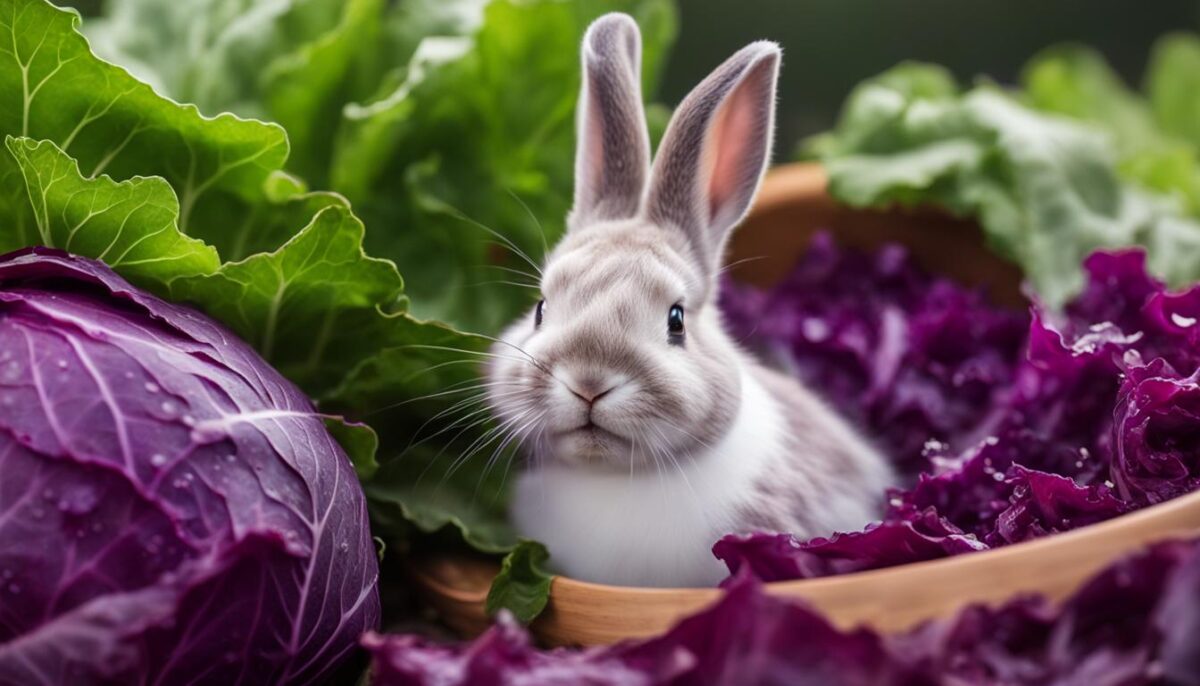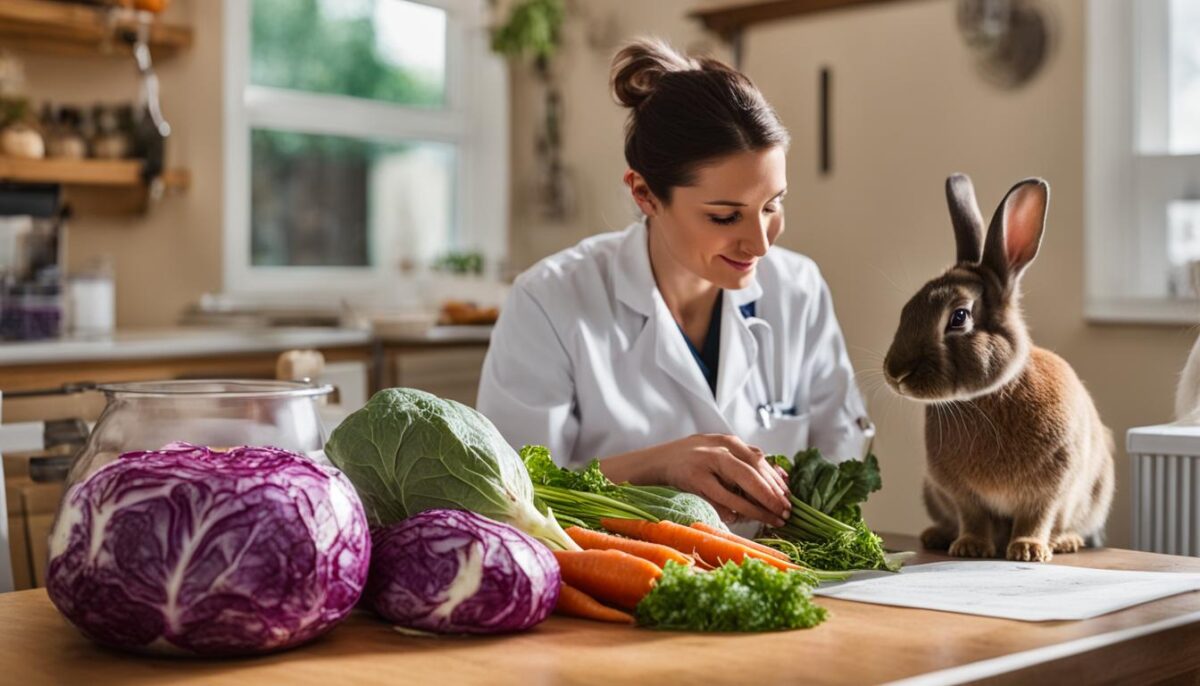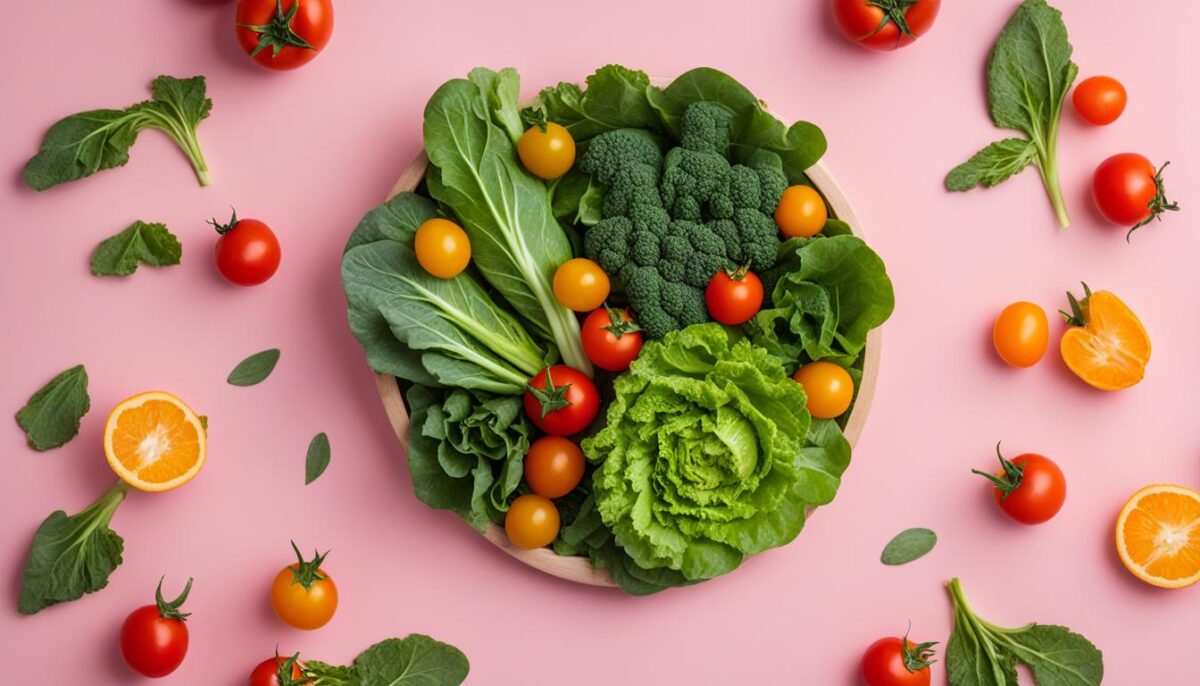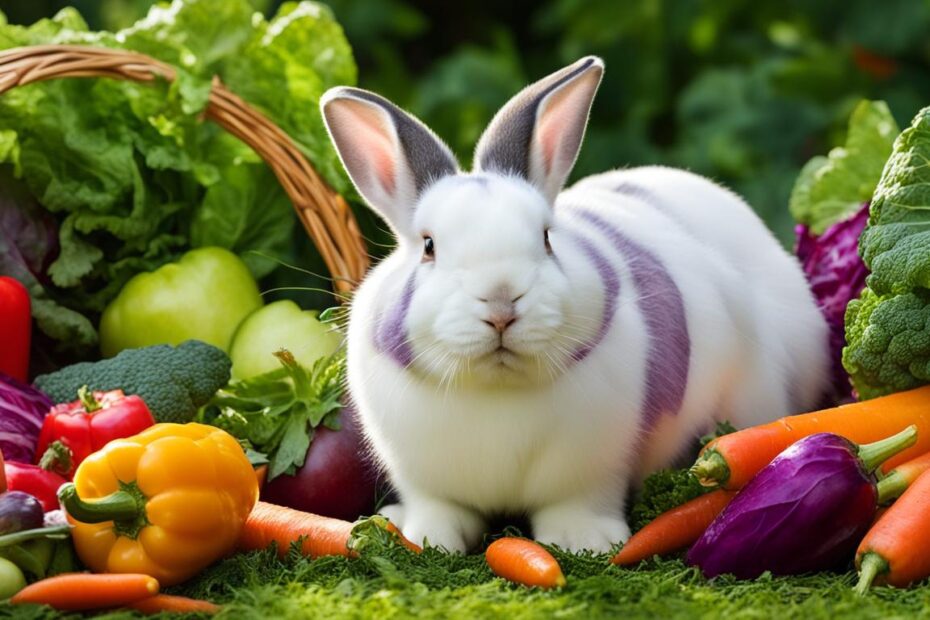Are you wondering if red cabbage is safe for your furry friend? If you’re seeking guidance on what vegetables to include in your rabbit’s diet, you’ve come to the right place. In this article, we’ll discuss whether rabbits can eat red cabbage, the nutritional benefits it offers, and how to incorporate it into their meals. Let’s dive in!
Key Takeaways:
- Red cabbage can be a healthy addition to a rabbit’s diet when given in moderation.
- It is important to introduce red cabbage slowly and monitor your rabbit’s response.
- Consult with a veterinarian before adding red cabbage or making any changes to your rabbit’s diet.
- Alongside red cabbage, remember to provide a variety of other safe vegetables for a balanced and nutritious rabbit diet.
- Always prioritize hay and pellets as the main source of nutrition for your rabbit.
Is Cabbage Safe for Rabbits?
Cabbage is a popular vegetable that many rabbit owners wonder about including in their pet’s diet. The good news is that cabbage is generally safe for rabbits to eat. However, it is important to introduce cabbage gradually to avoid potential stomach upsets. Rabbits have a delicate digestive system and need time to adjust to new foods.
“Rabbits rely on bacteria in their gut to digest their food, so they need time to adapt to new foods.”
Feeding cabbage to rabbits in moderation can provide them with essential nutrients and hydration. Cabbage is a rich source of vitamins including vitamin C and vitamin K, which are important for maintaining a healthy immune system and blood clotting function in rabbits. Additionally, cabbage is high in fiber, which aids digestion and promotes overall gut health.
“Cabbage is a nutritious option for rabbits, but it should be given in moderation to prevent thyroid issues and digestive problems.”
| Nutrients in Cabbage | Amount per 100g |
|---|---|
| Vitamin C | 36.6mg |
| Vitamin K | 76ug |
| Fiber | 2.5g |
While cabbage can be a healthy addition to a rabbit’s diet, it should not be the sole vegetable offered. It is important to provide a variety of vegetables, such as carrots, broccoli, kale, and bell peppers, to ensure a balanced and nutritious diet for rabbits.
Remember, every rabbit is unique, and some may have specific dietary needs or sensitivities. If you have any concerns or questions about introducing cabbage or any other food into your rabbit’s diet, it is always best to consult with a veterinarian who specializes in rabbit care.
Nutritional Benefits of Red Cabbage for Rabbits
Red cabbage offers various nutritional benefits for rabbits that contribute to their overall health and well-being. It is packed with essential vitamins and minerals that support vital bodily functions. Let’s delve into the specific nutritional components of red cabbage:
- Vitamin C: Red cabbage is an excellent source of vitamin C, which is essential for the growth and repair of tissues in rabbits. It also plays a crucial role in boosting their immune system.
- Vitamin K: Red cabbage contains vitamin K, which aids in blood clotting and contributes to healthy bone development in rabbits.
- Calcium: Calcium is crucial for maintaining strong bones and teeth in rabbits. Red cabbage provides a good amount of calcium, contributing to their skeletal health.
- Potassium: Red cabbage is rich in potassium, which helps regulate blood pressure and supports proper muscle function in rabbits.
- Manganese: Manganese is an essential mineral that supports various enzymatic processes in rabbits’ bodies, contributing to overall metabolic function.

“Red cabbage offers a range of essential vitamins and minerals, promoting a healthy digestive system, muscle function, and nervous system in rabbits.”
These nutritional elements found in red cabbage make it a valuable addition to a rabbit’s diet. However, it’s crucial to remember that red cabbage should be given in moderation, as excessive intake can lead to digestive issues. Consult with a veterinarian for personalized advice on incorporating red cabbage into your rabbit’s diet.
Risks of Feeding Red Cabbage to Rabbits
While red cabbage can provide health benefits to rabbits, it is important to be aware of the potential risks associated with feeding them this vegetable. Rabbits have delicate digestive systems, and consuming excessive amounts of red cabbage can lead to various digestive issues. These can include gas, indigestion, diarrhea, and loose stools.
One of the reasons behind these digestive issues is the high fiber content of red cabbage. Although fiber is an essential component of a rabbit’s diet, an excess amount can cause discomfort and disrupt their digestive balance. Additionally, red cabbage may contain harmful pesticides that can be toxic to rabbits and contribute to further complications.
In order to prevent these risks, it is crucial to feed red cabbage to rabbits in moderation. It should make up no more than 10% of their daily vegetable intake. It is recommended to start with small amounts and gradually increase the quantity over time, while closely monitoring the rabbit’s response to ensure their digestive system remains healthy and stable.
How to Feed Red Cabbage to Your Rabbit
When it comes to feeding red cabbage to your rabbit, there are a few guidelines to keep in mind. First and foremost, it’s important to thoroughly wash the cabbage before serving it to your furry friend. This will help remove any dirt or bacteria that may be present on the leaves.
Once the cabbage is clean, you can cut it into small pieces to make it easier for your rabbit to eat. Serving the cabbage raw is the best option, as cooking it can deplete some of its nutritional value. Remember to start with a small amount and gradually increase the quantity over time, allowing your rabbit to adjust to the new food.
It’s crucial to note that red cabbage should only make up a small portion of your rabbit’s daily diet. Ideally, it should not exceed 10% of their total vegetable intake. To ensure a balanced and nutritious diet, it’s important to offer a variety of other vegetables alongside the red cabbage. Carrots, broccoli, kale, spinach, celery, and bell peppers are all excellent options to incorporate into your rabbit’s diet.
| Vegetable | Feeding Amount |
|---|---|
| Red Cabbage | No more than 10% of daily vegetable intake |
| Carrots | Small portion daily |
| Broccoli | Small portion 2-3 times per week |
| Kale | Small portion 2-3 times per week |
| Spinach | Small portion 2-3 times per week |
| Celery | Small portion daily |
| Bell Peppers | Small portion daily |
By following these guidelines and offering a diverse range of vegetables, you can ensure that your rabbit receives a well-rounded and balanced diet. Remember to consult with a veterinarian for personalized advice and recommendations based on your rabbit’s specific needs.
Other Vegetables for Rabbits
In addition to red cabbage, there are several other safe vegetables that can be included in a rabbit’s diet. Offering a variety of vegetables ensures a balanced and nutritious diet for your furry friend. Here are some rabbit-friendly vegetables to consider:
- Carrots: Carrots are a popular choice for rabbits and provide essential vitamins and minerals. They should be fed in moderation due to their high sugar content.
- Broccoli: Broccoli is packed with nutrients and can be served raw or lightly steamed. It is important to introduce broccoli gradually to avoid any digestive issues.
- Kale: Kale is a nutritious leafy green that rabbits enjoy. It is rich in vitamins and minerals and can be served raw or cooked.
- Spinach: Spinach is another leafy green that rabbits can enjoy. However, it should be fed in moderation due to its high oxalate content.
- Celery: Celery is a crunchy and hydrating vegetable that rabbits love. It is low in calories and can be a healthy addition to their diet.
- Bell Peppers: Bell peppers are a colorful and flavorful choice for rabbits. They are rich in vitamin C and can be served raw or cooked.
When introducing new vegetables to your rabbit’s diet, it is important to start with small quantities and gradually increase over time. This allows their digestive system to adjust and reduces the risk of any stomach upsets. Remember to always wash and prepare the vegetables properly before serving.
Table: Nutritional Comparison of Rabbit-Friendly Vegetables
| Vegetable | Vitamin C (mg) | Vitamin A (IU) | Fiber (g) | Calcium (mg) |
|---|---|---|---|---|
| Carrots | 6.1 | 16,706 | 2.8 | 20 |
| Broccoli | 89.2 | 2,708 | 2.6 | 43 |
| Kale | 120 | 16,706 | 2 | 150 |
| Spinach | 28.1 | 2,813 | 2.2 | 30 |
| Celery | 3.1 | 449 | 1.6 | 40 |
| Bell Peppers | 127.7 | 3,175 | 2.1 | 9 |
It is important to note that each rabbit’s nutritional needs may vary, so it is best to consult with a veterinarian for guidance on the appropriate portion sizes and frequency of feeding different vegetables. By offering a variety of safe vegetables, you can provide your rabbit with a colorful and nutritious diet.

Table: Comparison of Rabbit-Safe Vegetables
| Vegetable | Benefits | Nutrients |
|---|---|---|
| Red Cabbage | Rich in essential vitamins and minerals | Vitamin C, Vitamin K, Calcium, Potassium, Manganese |
| Carrots | High in beta-carotene for eye health | Vitamin A, Vitamin K, Fiber, Potassium |
| Broccoli | Provides antioxidants for a strong immune system | Vitamin C, Vitamin K, Fiber, Folate |
| Kale | Supports bone health and promotes digestion | Vitamin A, Vitamin C, Calcium, Fiber |
| Spinach | Boosts iron levels and aids in digestion | Vitamin A, Vitamin C, Iron, Fiber |
| Celery | Provides hydration and supports dental health | Vitamin K, Fiber, Water |
| Bell Peppers | Rich in antioxidants and promotes heart health | Vitamin C, Vitamin B6, Fiber |
Alternatives to Red Cabbage
While red cabbage can be a nutritious addition to a rabbit’s diet, not all rabbits may enjoy or tolerate it well. If your furry friend isn’t a fan of red cabbage or experiences digestive issues after consuming it, there are several other rabbit-friendly vegetables that you can offer as alternatives. These vegetables provide variety and a range of nutrients to support your rabbit’s overall health and well-being.
Here are some other vegetables that you can consider substituting for red cabbage:
- Carrots: Carrots are a crunchy and vitamin-rich option that rabbits typically enjoy. They are a good source of beta-carotene, which is essential for eye health in rabbits.
- Broccoli: Broccoli is packed with vitamins and minerals, including vitamin C, which is important for a rabbit’s immune system. However, it should be given in moderation to prevent gas and digestive issues.
- Kale: Kale is a leafy green vegetable that is high in fiber and contains beneficial nutrients like vitamin K and calcium. It should be introduced gradually to avoid upset stomachs.
- Spinach: Spinach is another leafy green vegetable that rabbits can enjoy in small amounts. It provides a good source of iron, vitamins A and C, and folate.
- Celery: Celery is a crunchy and hydrating vegetable that can be offered as a healthy snack for rabbits. It is low in calories and high in fiber.
- Bell Peppers: Bell peppers are a colorful and vitamin-packed option for rabbits. They come in various colors, each offering a unique blend of nutrients.
Remember to introduce any new vegetable gradually and monitor your rabbit’s response. Each rabbit is unique and may have different preferences and tolerances. Offering a variety of vegetables alongside hay and pellets will help ensure a balanced and nutritious diet for your furry friend.

Summary:
Red cabbage can be a healthy addition to a rabbit’s diet, but if your rabbit doesn’t enjoy it or experiences digestive issues, there are plenty of other vegetables that you can feed them. Carrots, broccoli, kale, spinach, celery, and bell peppers are all nutritious alternatives that can provide variety in a rabbit’s diet. Remember to introduce new vegetables gradually and consult with a veterinarian for personalized advice on your rabbit’s dietary needs.
Conclusion
In conclusion, red cabbage can be a healthy addition to a rabbit’s diet when given in moderation. It provides essential nutrients, antioxidants, and fiber that contribute to a rabbit’s overall well-being. However, it is crucial to introduce red cabbage slowly and monitor the rabbit’s response to avoid any digestive issues.
Consulting with a veterinarian is always recommended before adding red cabbage or any other new food to a rabbit’s diet. They can provide personalized advice and ensure that the rabbit’s nutritional needs are met. It is important to remember that variety is key in a rabbit’s diet, so offering a range of safe vegetables alongside hay and pellets is essential for their optimal nutrition.
By following the guidelines and incorporating red cabbage in moderation, rabbit owners can provide their furry friends with a diverse and nutritious diet. Remember to prioritize the well-being of your rabbit by consulting with a veterinarian and ensuring that their diet meets their individual needs.
FAQ
Can rabbits eat red cabbage?
Yes, red cabbage can be a healthy addition to a rabbit’s diet when given in moderation.
Is cabbage safe for rabbits?
Yes, cabbage is safe for rabbits to eat, but it should be introduced gradually to avoid stomach upsets.
What are the nutritional benefits of red cabbage for rabbits?
Red cabbage is rich in essential vitamins and minerals that are beneficial for rabbits, including vitamin C, vitamin K, calcium, potassium, and manganese.
What are the risks of feeding red cabbage to rabbits?
Feeding red cabbage in excess can cause digestive issues in rabbits, such as gas, indigestion, diarrhea, and loose stools. Additionally, red cabbage may contain harmful pesticides that can be toxic to rabbits.
How should I feed red cabbage to my rabbit?
Red cabbage should be thoroughly washed, cut into small pieces, and served raw. Start with a small amount and gradually increase the quantity over time. It should make up no more than 10% of a rabbit’s daily vegetable intake.
What are some other vegetables that are safe for rabbits?
Carrots, broccoli, kale, spinach, celery, and bell peppers are all suitable options for rabbits.
Why is moderation important in a rabbit’s diet?
Moderation is key to prevent digestive issues and ensure a balanced diet for rabbits. The majority of their nutrition should come from hay and pellets.
Should I consult a veterinarian for advice on my rabbit’s diet?
Yes, it is always a good idea to consult with a veterinarian when making changes to a rabbit’s diet. They can provide personalized advice based on your rabbit’s specific needs.
Are there alternatives to red cabbage that I can feed my rabbit?
Yes, if your rabbit does not enjoy or tolerate red cabbage well, there are plenty of other vegetables that can be offered instead, such as carrots, broccoli, kale, spinach, celery, and bell peppers.


